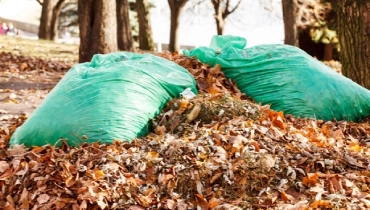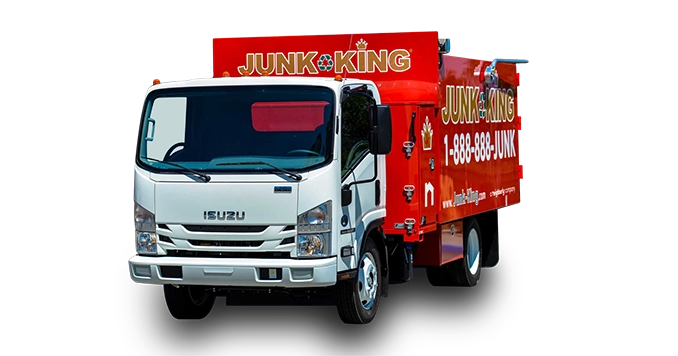
[This article was first published in March 2021 and has been expanded and revised.]
All those leaves, grass, and other trimmings are completely organic and biodegradable, right? Yes, but they still don't belong in landfills. Here's why.
Despite what might seem an intuitive assumption about organic yard waste material - or even food waste - organic waste can be quite harmful to the environment.
What You Probably Don't Know About Organic Waste
Organic waste is broadly defined as,
"... material that is biodegradable and comes from either a plant or an animal. Organic waste is usually broken down by other organisms over time and may also be referred to as wet waste. Most of the time, it is made up of vegetable and fruit debris, paper, bones, and human waste which quickly disintegrates."
For those of us at home, this is usually yard waste - grass trimmings, leaves, weeds, etc. - and all the food scraps we throw out. You can add to this old paper towels, napkins, and other paper products. And we tend to generate quite a bit of it!
In fact, Yale University estimated back in 2013 that we tossed out 1,871 pounds of food per person in the United States alone.
And one of the problems with all this grass, leaves, sticks, paper, and wasted food is that it has a tendency to produce large amounts of methane gas once inside a landfill.
According to Sciencing.com,
"Methane is a gas that remains in the atmosphere for up to 15 years. This greenhouse gas is produced by many natural and human-influenced sources. Landfills, coal mines and wastewater treatment, natural gas and petroleum facilities are only a few of the sources that emit this gas."
And the other problem with methane in landfills is that it is a greenhouse gas that’s 28 times more potent than carbon dioxide. Landfill gas also contributes to smog, worsening health problems like asthma.
On the bright side, according to another source,
"Landfill methane can be tapped, captured, and used as a fairly clean energy source for generating electricity or heat, rather than leaking into the air or being dispersed as waste. The climate benefit is twofold: prevent landfill emissions and displace coal, oil, or natural gas that might otherwise be used."
The only problem is that not nearly of this is taking place and there are thousands of landfills that are no longer operating, but are full of potentially hazardous waste materials including significant amounts of organic waste.
Recycling Organic Waste
Transforming Residential Yard and Food Waste for a Sustainable Future
Recycling organic waste, such as residential yard waste and food waste, plays a crucial role in promoting environmental sustainability and reducing the strain on our diminishing landfills. By diverting organic waste from the traditional waste stream, you can help to harness its potential for beneficial use, including composting and energy generation.
Here are some practical examples of incorporating this practice into our daily lives:
Residential Yard Waste Recycling
Residential yard waste includes grass clippings, leaves, branches, tree trimmings, and garden waste. For example, your grass clippings can be composted to create nutrient-rich soil, while branches and tree trimmings can be chipped and used for mulching or converted into biomass fuel.
- Composting: Yard waste can be composted along with other organic materials, such as food scraps, to produce nutrient-rich compost for gardening and landscaping.
- Mulching: Chipped branches and tree trimmings can be used as mulch, conserving soil moisture, preventing weed growth, and enhancing plant health.
- Biomass Energy: Yard waste can be converted into biomass fuel, which can generate renewable energy and reduce reliance on fossil fuels.
Residential Food Waste Recycling
Residential food waste includes uneaten food, food scraps, expired produce, and kitchen waste such as fruit and vegetable peels, coffee grounds, eggshells, and leftover cooked food.
Food waste recycling methods include:
- Home Composting: Food waste can be composted using a compost bin or pile, resulting in nutrient-rich soil amendment for gardens and potted plants.
- Vermicomposting: Utilizing worms to decompose food waste, vermicomposting produces high-quality worm castings that can enhance soil fertility.
- Anaerobic Digestion: Food waste can be processed in anaerobic digesters, producing biogas (methane) that can be used for heat and electricity generation.
- Community Programs: Participating in community food waste recycling initiatives enables the collection and centralized composting of residential food waste, benefiting the entire neighborhood.
Benefits of Recycling Organic Waste
Environmental Benefits
- Reduces Landfill Burden: Diverting organic waste from landfills minimizes greenhouse gas emissions, as organic matter decomposing in landfills produces methane, a potent greenhouse gas.
- Conserves Resources: Recycling organic waste reduces the need for synthetic fertilizers, conserving resources and minimizing pollution from chemical runoff.
Economic Benefits
- Cost Savings: Recycling organic waste can lower waste management costs by reducing the volume of waste requiring collection and disposal.
- Revenue Generation: Biomass energy production and sale of compost or compost-based products can generate revenue streams for communities.
Social Benefits
- Community Engagement: Recycling organic waste encourages community involvement and education about sustainable waste management practices.
- Improved Soil Health: Utilizing compost and organic soil amendments enhances soil fertility, leading to healthier plants and increased agricultural productivity.
Recycling organic waste, encompassing residential yard waste and food waste, is a critical step towards achieving a sustainable future. Through composting, mulching, vermicomposting, and anaerobic digestion, we can harness the potential of organic waste, conserving resources, reducing landfill burden, and generating economic and environmental benefits.
By embracing these practices at the residential level, we can contribute to a healthier environment and build more sustainable communities.
Organic Waste Disposal and You
The good news is that all of us can contribute substantially to the reduction of organic waste in our landfills and the municipal waste stream.
We've put together an informational graphic to provide a brief overview of organic waste and recycling in the United States.
Recycling Your Yard Debris Other Organic Waste
Depending on how big your backyard or other outdoor space is, you may create more waste than your green recycling bin can manage. Fortunately, you can recycle much of the organic waste into mulch and compost.
And, while this can take care of some of your debris, what do you do with the rest?
The worst thing you can do is to have piles of debris sitting around after sprucing up your backyard. Not only is it unsightly, it can be a potential hazard. The good news is that if you have more debris than you can get rid of yourself, or you don’t want to haul it out yourself, there is an affordable and easy option.
Hiring a professional waste removal company to pick it up and haul it away is the best way to go.
At Junk King we routinely haul almost all types of yard debris, including branches, clippings, stumps, soil and more. We specialize in removing and hauling all types of debris from residential landscaping and home improvement projects.
And we make sure it is disposed of in a truly green and eco-friendly manner!
Call Junk King for Yard Waste and Debris Removal
Whether you're clearing up debris and trash from your yard after your spring cleaning project, cleaning up from a home renovation, or just getting ready for the spring, you can count on Junk King to provide you with the tools you need to get rid of your unwanted yard waste and junk.
And, regardless of whether you choose to make use of our full-service debris and junk removal, or rent one of our self-service MINI Dumpsters, we will still haul your waste materials to the most appropriate green disposal destination.
Our professional and friendly crew can come and do all the heavy lifting and hauling for you or, if it works better with your schedule and type of cleanup project, you can rent one of our handy MINI Dumpsters and do the loading part yourself.
Either way, Junk King always has the best solutions for your large junk disposal needs.
Give us a call and our expert and insured trash removal team will call 15 to 30 minutes before we arrive at your home. And once we arrive we’ll give you a free estimate based on how much room your materials will take up in our truck. Then you just point and we’ll haul your items into our junk removal trucks, all with no hidden fees.
Ready to get rid of that yard waste and other junk? It’s as simple as 1, 2, 3.
You can make an appointment by booking online above or by calling.

